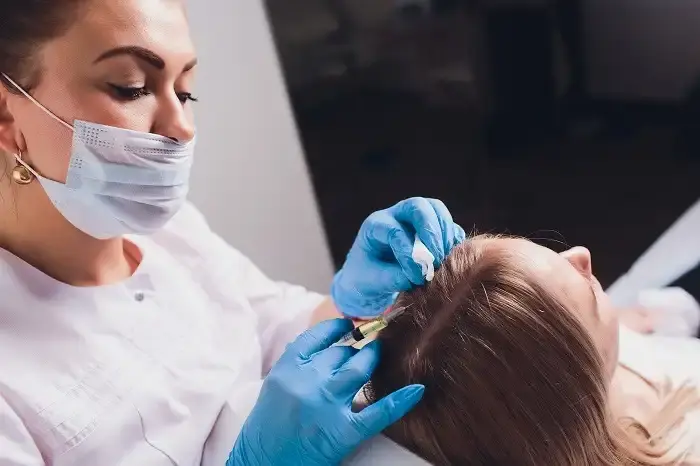Hair transplant surgery is a significant medical procedure that requires careful post-operative care to ensure optimal results. Among the many recommendations given by healthcare professionals, one crucial piece of advice is to avoid alcohol consumption after the surgery. Here, we will explore seven key reasons why abstaining from alcohol after a hair transplant is essential for a successful recovery and the best possible outcome.
1. Alcohol Impairs Healing
Alcohol Reduces Blood Supply
Alcohol consumption can negatively affect the body’s blood supply, which is vital for healing. When you drink alcohol, your blood vessels can constrict, reducing the flow of blood to the scalp. This reduction in blood supply can impair the delivery of essential nutrients and oxygen to the transplanted hair follicles, which are critical for their survival and growth.
Delays Tissue Repair
Alcohol has been shown to delay the process of tissue repair. After a hair transplant, the scalp needs to heal, and the newly implanted follicles need to integrate into the scalp tissue. Alcohol can interfere with the normal healing process, potentially leading to prolonged recovery times and suboptimal results.
2. Increases Risk of Infection
Compromises Immune System
Alcohol consumption can weaken the immune system, making the body more susceptible to infections. A robust immune system is essential after a hair transplant to prevent infections at the surgical sites. By drinking alcohol, you compromise your body’s ability to fight off potential infections, increasing the risk of complications.
Affects Wound Healing
The healing process after a hair transplant involves the formation of scabs and the closure of small wounds where the follicles were implanted. Alcohol can disrupt this delicate process, increasing the risk of infections at these sites. An infection can not only prolong the healing process but also affect the final appearance of your hair transplant.
See Also: 6 Foods You Should Not Eat Before Hair Transplant
3. Dehydration
Alcohol Causes Dehydration
Alcohol is a diuretic, meaning it increases the production of urine and can lead to dehydration. Dehydration can be detrimental to the healing process because it affects the body’s ability to transport nutrients and remove waste products. Proper hydration is crucial for the health of the hair follicles and the overall recovery process.
Impact on Scalp Health
Dehydration can also directly affect the scalp, making it dry and less conducive to healing. A dry scalp can be more prone to irritation and itching, which can lead to scratching and potential damage to the transplanted follicles. Keeping the scalp hydrated is essential for a smooth recovery and the best possible results.
4. Interferes with Medication
Interaction with Painkillers
After a hair transplant, you may be prescribed painkillers to manage discomfort. Alcohol can interact negatively with these medications, potentially enhancing their side effects or reducing their effectiveness. This interaction can complicate your recovery process and make it more challenging to manage post-operative pain.
Affects Antibiotics
If you are prescribed antibiotics to prevent infection, alcohol can interfere with their absorption and efficacy. This interference can reduce the effectiveness of the antibiotics, increasing the risk of infection and complicating the healing process. It is crucial to avoid alcohol to ensure that all prescribed medications work as intended.
5. Increases Bleeding Risk
Alcohol Thins the Blood
Alcohol has anticoagulant properties, meaning it can thin the blood and increase the risk of bleeding. After a hair transplant, avoiding excessive bleeding is crucial for proper healing. Alcohol-induced thinning of the blood can lead to excessive bleeding at the surgical sites, which can disrupt the healing process and potentially dislodge the newly implanted follicles.
Impact on Post-Surgical Care
Managing bleeding is a critical aspect of post-surgical care after a hair transplant. Alcohol consumption can complicate this process, making it more difficult to control bleeding and ensuring the surgical sites remain clean and undisturbed. Avoiding alcohol helps minimize this risk and supports a smoother recovery.
6. Swelling and Inflammation
Alcohol Promotes Inflammation
Alcohol can promote inflammation in the body, which is counterproductive to the healing process after a hair transplant. Inflammation can increase swelling at the surgical sites, leading to discomfort and potentially affecting the final outcome of the transplant. Reducing inflammation is essential for a successful recovery, and avoiding alcohol is a key part of this process.
Delays Reduction of Swelling
Swelling is a common side effect after a hair transplant, and it typically subsides over time. However, alcohol consumption can delay the reduction of swelling, prolonging discomfort and affecting your appearance. By avoiding alcohol, you can help ensure that swelling diminishes more quickly and that your recovery progresses smoothly.
7. Compromises Overall Health
Impact on Liver Function
The liver plays a crucial role in detoxifying the body and processing medications. Alcohol consumption can strain liver function, making it less efficient at processing the medications prescribed after a hair transplant. This inefficiency can impact the effectiveness of these medications and potentially prolong the recovery process.
General Health and Well-being
Overall health and well-being are essential for a successful recovery after a hair transplant. Alcohol consumption can negatively affect various aspects of your health, from your sleep patterns to your nutritional intake. Maintaining good health is vital for supporting the healing process and achieving the best possible results from your hair transplant.
Conclusion
Avoiding alcohol after a hair transplant is crucial for ensuring a smooth recovery and optimal results. Alcohol can impair healing, increase the risk of infection, cause dehydration, interfere with medications, increase bleeding risk, promote inflammation, and compromise overall health. By abstaining from alcohol, you can support your body’s natural healing processes and enhance the success of your hair transplant. Following your surgeon’s post-operative care instructions, including avoiding alcohol, is essential for achieving the best possible outcome and enjoying the full benefits of your hair transplant.
Related topics:

